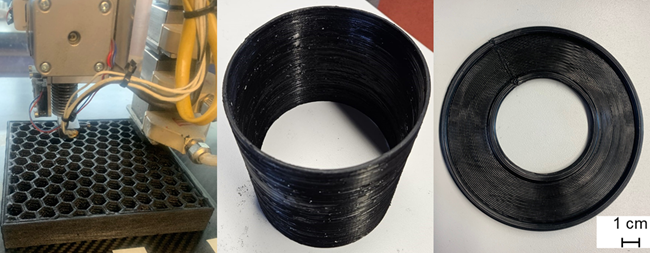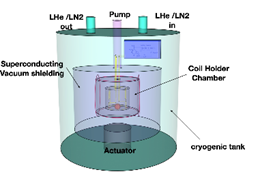Research Group: Transport Technology
Transport Technology
-
Future Conveyor Drive - Monetary and ecological belt conveyor optimisation by means of driven idlersWithin the framework of this research project, the monetary and ecological optimisation of belt conveyor systems by means of driven idlers is being investigated. With help of a specially developed co-simulation environment, their influence on the operating behaviour and dynamic system stability of belt conveyor systems is analysed. The aim is to develop a selection logic for determining the optimised use of driven idlers for industry.Led by: M. Sc. Carsten SchmidtYear: 2022Funding: AIFDuration: 01.08.2022 - 31.07.2024
![]()
![]()
-
LernFFZ - Imitation learning for the transfer of human skills to industrial trucksThe aim of the research project is to extract and transfer human driving skills to semi-automated industrial trucks. The approach is based on imitation learning methods. This new control approach is intended to enable the industrial truck to autonomously pick up load carriers located in any position in the room.Led by: M. Sc. Mirko Schaper, M. Sc. Justus LübbehusenYear: 2023Funding: BMWKDuration: 01.12.2023 - 30.11.2026
![]()
![]()
-
ModHalbo - Development and validation of a novel transportation and storage concept using interconnected multidirectional heavy-duty conveyor modulesThe aim of this research project is to develop a new type of modular warehouse floor for omnidirectional transportation in intralogistics. The floor should be able to carry a load of 9 tons so that the operational process does not have to be interrupted.Led by: M. Sc. Pavel Bakhteev, M. Sc. Felix WentzienYear: 2024Funding: Forschungsgemeinschaft Intralogistik/Fördertechnik und Logistiksystem e.V (IFL)Duration: 01.08.2024 - 31.01.2027
![]()
![]()
Automation Technology
-
SELFLED - Selective fluorescence microscopy of single cells based on highly integrated microLED arraysThe joint research project SELFLED is working on a new type of miniaturized illumination unit for fluorescence microscopy. Optical simulations and algorithms will be used to design microlens arrays that influence the beam level of microLEDs in such a way that individual cell samples can be selectively illuminated and examined.Led by: M. Sc. Anna-Lena FritzeYear: 2024Funding: BMBFDuration: 01.01.2024 - 31.12.2026
![]()
![]()
-
AME 2.0 - New development of a 3D printer for quality-optimized additive manufacturing of rubber-based moulded partsThe Additive Manufacturing of Elastomers- (AME)-process from the previous Elastomer-3D project is being optimized as part of this project. A new 3D printer is being developed for this purpose, which will be used especially for additive manufacturing of industrial components.Led by: M. Sc. Sebastian LeineweberYear: 2024Funding: German Aerospace Center (DLR)Duration: 01.04.2024 - 31.03.2026
![]()
![]()
-
AI-based Process Optimization for Cost Reduction in Belt ManufacturingAs part of a cooperation project with Forbo Siegling, an AI-based assistance system for belt production is being developed. The goal is the intelligent integration of expert knowledge and machine data to increase quality and efficiency through data-driven process optimization.Led by: M. Sc. Johannes FritzeYear: 2025Duration: 01.03.2025 - 30.06.2027
Optronics
-
PhoenixD - Flexographic printing of optical networksThe PhoenixD research vision is to implement precision optical systems resource and cost-effectively by using additive manufacturing technology. For this purpose, researchers from mechanical engineering, physics, electrical engineering, computer science and chemistry intend to work together on the simulation, production and application of optical systems. So far, such systems usually consist of glass-based components tediously assembled in small batches, often even by hand. Experts from the various disciplines will aim to work together on a digitized production system that can realize individualized products. In this subproject, the production of planar optical network structures is being researched. For this purpose, a classic printing processes, the flexo printing, is used to enable a cost-effective production.Led by: M. Sc. Jonathan PleußYear: 2019Duration: 01.01.2019 - 31.12.2025
![]()
![]()
-
PhoenixD - Electrical integration of optical networksImplementing optical precision systems quickly and cost-effectively using additive manufacturing: This is the vision of PhoenixD. In this subproject, research is conducted on the production of planar optical network structures. The optical coupling of the light sources to the optical waveguide, which is printed or dispensed, for example, is one of the research questions to be solved. Here, precise mounting and alignment to the end face of the waveguide is of enormous importance.Led by: M. Sc. Laura FüttererYear: 2019Duration: 01.01.2019 - 31.12.2025
![]()
![]()
-
3D-MosquitOprint3D-MosquitOprint researches the integration of optically transparent waveguides in cavities on three-dimensional circuit carriers. The manufacturing process is based on the Mosquito method, in which a light-conducting core is dispensed into a liquid cladding polymer. Afterwards, the structure is cured by UV light. For use as electro-optical hybrid components, there are also investigations into efficient coupling between manufactured waveguides and diodes. For this purpose, the end surfaces are prepared and assembled with diodes.Led by: M. Sc. Laura FüttererYear: 2022Funding: AiF (IGF)Duration: 01.07.2022 - 30.06.2024
![]()
![]()
-
FlexBiPOF - Flexo-printed Coupling System for Bidirectional Operation of Polymer Optical FibresThe aim of this research project is to develop an optical transceiver that makes it possible to operate a polymer optical fibre (POF) in two communication directions. This requires a waveguide element that is produced additively by flexography.Led by: M. Sc. Janka KirsteinYear: 2024Funding: ZIMDuration: 01.05.2024 - 30.04.2026
![]()
![]()
Production in Space
-
Interferometry with entangled atoms in spaceIn this project, the entanglement of atoms in microgravity is measured using a robust and compact atomic sensor. The main goal is to demonstrate interferometric sensitivity beyond the standard quantum limit in microgravity.Led by: M. Sc. Alexander HeidtYear: 2021Funding: German Aerospace Center (DLR)Duration: 01.09.2021 - 31.12.2024
-
Laser-based additive manufacturing of metal parts from powder in microgravityThe aim of this research project is the development of a laser-based additive manufacturing process for the production of metal parts from powder in microgravity. The approach is based on the "Laser Metal Deposition" (LMD) process known for earth gravity.Led by: M. Sc. Marvin RaupertYear: 2021Funding: DFGDuration: 07.2021 - 06.2024
![]()
![]()
-
Dark Energy Search with Atom Interferometry in the Einstein-ElevatorThe collaboration DESIRE uses the free-fall simulator Einstein-Elevator for dark energy search with atom interferometry. For this purpose the apparatus MAIUS-A will be reconstructed with a specialized test mass and afterwards operated in microgravity.Led by: M. Sc. Alexander HeidtYear: 2021Funding: German Aerospace Center (DLR)Duration: 01.04.2021 - 31.03.2024
-
Hannover Center for Microgravity ResearchThe focus of the DFG-funded research center "Hannover Center for Microgravity Research" is the establishment of an administrative service and management structure for the Einstein-Elevator. This should enable effective use of the Einstein-Elevator, also for external scientists.Led by: Dr.-Ing. Christoph LotzYear: 2022Funding: DFGDuration: 01.01.2022 - 31.12.2024
-
Levitated Magnets for Quantum MetrologyThis project aims at a systematic investigation of sensors based on levitated micromagnets, which allow to measure ultra-low torques and magnetic fields, demonstrating an unprecedented energy resolution.Led by: M. Sc. Alexander HeidtYear: 2022Funding: QuantERA Project of the EU (DFG)Duration: 01.01.2022 - 31.12.2024
![]()
![]()
-
Activity of comets under partial gravityCometary activity, which in this case refers to the ejection of dust from the surface, can be simulated in the laboratory, but more than a thousand times Earth's gravity overrides the gravity prevailing on comets. With the help of the Einstein-Elevator it will be possible to perform experiments under comet-like conditions.Led by: M. Sc. Emre TahtaliYear: 2022Funding: German Aerospace Center (DLR)Duration: 01.08.2022 - 31.07.2025
![]()
![]()
-
Ultrasonic levitation as a handling tool for ISM processesThe joint project Lev4ISM pursues the development of an innovative, resource-saving manufacturing process for In-Space Manufacturing (ISM), which aims to enable the substrate-free production of components in microgravity. By using acoustic levitation and implementing coupled simulations, the precise handling of particles and components in microgravity will be researched to create long-term solutions for sustainable and flexible space missions.Led by: M. Sc. Jan RaffelYear: 2023Funding: German Aerospace Center (DLR)Duration: 01.09.2023 - 31.08.2025
![]()
![]()
-
Multifunctional Measurement System for Microgravity ResearchThe aim of this research project is to develop a sensor system for research in weightlessness. The system should be able to record and process relevant data.Led by: M. Sc. Richard SperlingYear: 2024Funding: Ministry of Science and Culture of Lower Saxony (MWK)Duration: 01.01.2024 - 30.06.2024
![]()
![]()
-
Development of a multi-user facility for quantum experiments in the Einstein-Elevator by integrating an ISS express rackThe project aims to develop a multi-user express rack that serves as an interface between the Einstein-Elevator and the scientific experiments on the ISS and is based on the standardized sizes of the International Standard Payload Rack (ISPR). Technical specifications such as power supply, communication systems, and cooling must be adapted to the special environmental conditions of the Einstein-Elevator to support and validate current and future ISS research projects efficiently.Led by: M. Sc. Marvin RaupertYear: 2024Funding: QuantumFrontiersDuration: 01.07.2024 - 31.12.2024
![]()
![]()
-
Microgravity Assembly for Acceleration TestingThe aim of this research project is to develop a module that records and evaluates microgravity data within an Orbital Paradigm orbiter. The orbiter is to be used within low Earth orbit.Led by: M. Sc. Richard SperlingYear: 2024Duration: 01.06.2024 - 31.12.2026
![]()
![]()





























































